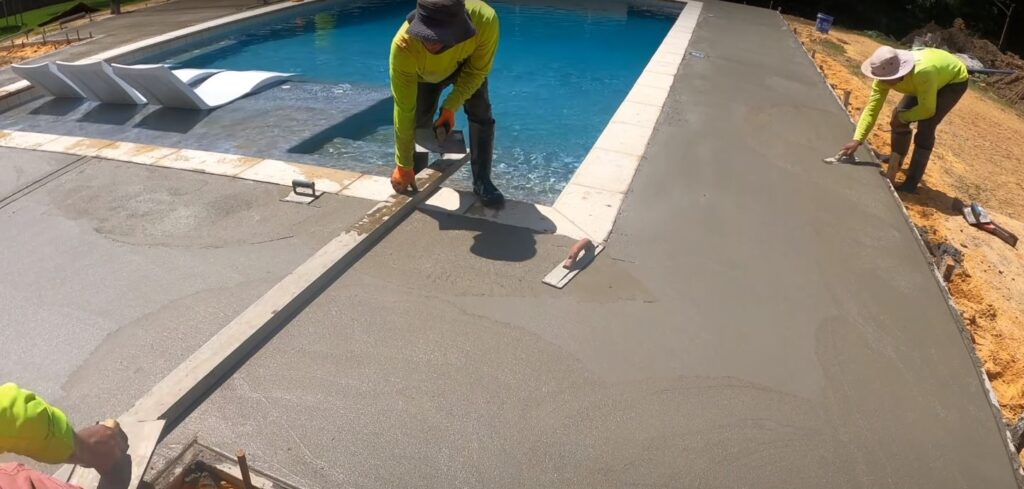Chlorine’s Impact on Concrete in Pool Surroundings
In Auckland, where backyard pools are a common feature in suburbs like Mission Bay and Devonport, understanding how pool chemicals, specifically chlorine, interact with concrete surfaces is crucial. Chlorine, known for its strong oxidizing properties, can pose a risk to concrete around pools. Over time, regular exposure to chlorinated water can lead to the degradation of concrete surfaces, manifesting as discoloration, increased porosity, and surface weakening. This is due to chlorine’s reactive nature with concrete’s constituents, leading to a slow erosion of the material.
Concrete’s Vulnerability to Chlorine Damage
Concrete’s vulnerability to chlorine damage is influenced by various factors, each contributing to how significantly the concrete is affected:
Quality of Concrete
- Higher density: Concrete with a denser composition is more resilient.
- Mix quality: A mixture with proper proportions of cement, sand, and aggregates can withstand chlorine’s effects better.
Age of Concrete
- Curing process: Newly laid concrete, still in the curing phase, is more alkaline and reactive to chlorine.
- Long-term exposure: Over years, the cumulative impact of chlorine can erode even well-cured concrete.
Maintenance Practices
- Regular sealing: Applying sealants can create a protective barrier against chlorine penetration.
- Cleaning routines: Timely removal of chlorinated water and debris helps in preserving the concrete surface.
Environmental Factors
- Sunlight exposure: UV rays can exacerbate chlorine’s effects, leading to faster degradation.
- Weather conditions: In areas with fluctuating temperatures, the expansion and contraction of concrete can make it more susceptible to chlorine damage.
Understanding these factors can help in taking preventive measures to protect concrete surfaces in pool environments from chlorine-induced deterioration.
Health and Safety Considerations
When it comes to health and safety, particularly in public spaces like community pools in Auckland, it’s vital to balance chlorine levels for sanitary purposes while protecting the integrity of concrete structures. Excessively high chlorine levels can accelerate concrete damage and potentially cause health issues for pool users.
Concreting Solutions in Auckland
For residents in Auckland seeking durable solutions for their pool areas, options like sealed concrete, high-grade mixes, or alternative materials can be explored. Professional Concrete Driveways Auckland specializes in providing tailored solutions that consider the unique challenges of poolside concrete, ensuring longevity and aesthetic appeal.
In conclusion, while chlorine is essential for pool hygiene, its interaction with concrete demands careful consideration and proactive maintenance. Selecting the right type of concrete, along with regular upkeep, can mitigate the effects of chlorine, maintaining the structural and aesthetic quality of pool areas. For those in Auckland planning a poolside concrete project, consulting with local experts like Professional Concrete Driveways Auckland is a wise step to ensure a lasting and safe outdoor space.
Key Insights on Concrete’s Vulnerability to Chlorine Damage
Chlorine’s Reactive Nature with Concrete Chlorine, commonly used in pools, can react with concrete, causing gradual erosion, discoloration, and surface weakening.
Influencing Factors
- Quality of the concrete mix and its density significantly affect chlorine resistance.
- Newly laid concrete is more vulnerable due to its higher alkalinity.
- Adequate maintenance, including regular sealing and cleaning, can mitigate chlorine’s impact.
Environmental and Usage Aspects
- Sunlight and weather variations can intensify chlorine damage.
- Regular exposure to chlorinated water increases the risk of concrete degradation.
Preventive Measures Choosing high-quality concrete, implementing proactive maintenance practices, and consulting experts like Professional Concrete Driveways Auckland are key to ensuring the longevity of poolside concrete structures in Auckland.
Frequently Asked Questions on Concrete’s Vulnerability to Chlorine Damage
How Does Chlorine Affect Concrete?
Chlorine can react with concrete, leading to surface erosion, discoloration, and increased porosity.
Is New Concrete More Susceptible to Chlorine Damage?
Yes, newer concrete is more alkaline and reactive, making it more vulnerable to chlorine.
Can Regular Maintenance Reduce Chlorine Damage in Concrete?
Regular maintenance, including sealing and cleaning, can significantly mitigate chlorine’s harmful effects.
Does the Quality of Concrete Influence Its Resistance to Chlorine?
Higher-quality, denser concrete mixtures offer better resistance to chlorine damage.
Are There Specific Environmental Factors That Worsen Chlorine’s Effect on Concrete?
UV exposure and fluctuating temperatures can exacerbate chlorine damage in concrete.
Can Sealing Concrete Prevent Chlorine Damage?
Sealing creates a protective barrier that can reduce chlorine penetration and damage.
How Often Should Concrete Near Pools Be Maintained?
Maintenance frequency depends on chlorine exposure levels and environmental conditions.
Does Chlorine Impact the Structural Integrity of Concrete?
Prolonged exposure can weaken concrete’s structure by eroding its surface.
Can Chlorine Damage Be Repaired in Concrete?
Minor damage can often be repaired, but extensive erosion might require more significant interventions.
Are There Alternative Materials to Concrete for Pool Areas?
Yes, there are alternatives like pavers or natural stone that may offer different levels of resistance to chlorine.
Top of Form


